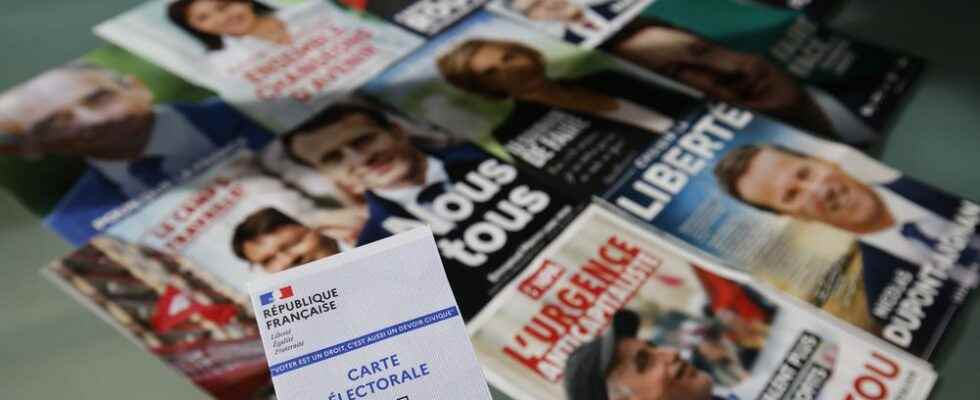Is it because the campaign was particularly short? Because we haven’t talked much about substantive topics other than Ukraine and the Covid? Or because no one – with the exception of a few good students – bothers to read the summaries of programs that a few brave journalists are struggling to write ? In recent days, our family, friendly or professional messaging is full of tables, podiums, histograms sent by our mothers, best friend or simple colleague. Which candidate are you closest to? What political family do you belong to? Hesitator 2022… For the past few weeks, everyone has been testing themselves, consolidating themselves, having fun with this playful way of doing politics which was not born with this election but has enjoyed unprecedented success. We admit it, we even ended up giving in to temptation.
Beyond the game, some look to these quizzes for inspiration or comfort. The sites may take many precautions, indicate that this is only an indication, refer, for the most conscientious, to the programs of the candidates, remind that above all nothing should be overinterpreted, certain first-time voters or the far removed from politics draw their inspiration directly from the ballot paper. Others, more committed, seek confirmation of their choice there. Yes, they have such ideas and yes, it is such a candidate who embodies them. They are not always safe from a surprise.
And then there are the hesitant, the doubters. Often classically right or left, or formerly left or right. For a time, they swore that they would vote for their natural candidate, Valérie Pécresse, Anne Hidalgo or Yannick Jadot. Then, doubt set in, we talked to them about useful voting, Macron, Mélenchon, access to the second round. They were almost convinced when a friend or relative slipped in a short sentence, but no, voting can’t just be a strategy, it also takes heart and desire. And again, the doubt: after all, if it were true? So to decide between their heart and reason, they answered a few questions.
To reassure grumpy people who would only see in them vulgar distractions, the sites multiply the pledges of seriousness. There are those who refuse to call themselves “quiz” and who present themselves as “compass”, those who claim a scientific guarantee or an exploration in the depths of the programs. All display a minimum of thirty questions to clearly identify the profile, sometimes extra to refine the choice. The themes are varied, nuclear, immigration, purchasing power, institutions to give the impression of not favoring any of them. Some sites opt for formulations that stick closely to their political line, others have their obsessions like this very exotic “open a penal colony in the Kerguelen Islands reserved for those convicted of terrorism”, inspired by Nicolas Dupont-Aignan, but crossed only once so connoted is it. We guess that by answering yes too quickly to such and such a question, we run the risk of finding ourselves a little out of step with the opinion we have of ourselves.
The electoral leaflets of the presidential candidates, April 6, 2022 in Paris
afp.com/Ludovic MARIN
Yet even the least suspicious can’t help but think the result is biased. Because they are interested in certain subjects and much less in others and they have the impression that everything is taken into account without any nuance. Because they don’t necessarily have more specific opinions than the usual coffee shop on certain topics and that, however, it will weigh in the final choice. Because they are sometimes asked, before the end of the quiz, if they feel more on the right or on the left, close to such and such a candidate and in which socio-professional category they fall into, as if the designer of the test wanted to be sure of do not crash.
So, inevitably, when the result appears in the form of very scientific histograms analyzing the conservatism/liberalism/cultural/politics of the respondent or more traditional rankings of candidates according to the supposed proximity, the reactions are diverse. Some are happy because they find themselves in it fully, others laugh so much they consider the conclusion grotesque. And then there are the dissatisfied, those who rebel against this classification which is not theirs. Who wants to discover himself as a social democrat when he thinks he is a social-republican? Why be constantly ranked among the followers of Anne Hidalgo when it was decided a long time ago that we would not vote for her, forgetting that voting intentions pass, but ideas remain? What is worth to us to appear in the camp of the order and the authority whereas one believed nicely to be sovereigntist but rather of the left?
The first take the path to the voting booth with a bit of satisfaction, the second send all their relatives this funny result, reminding them that they have chosen to vote blank anyway and that it will not change their decision. The third will sweep the result with a backhand. And without telling anyone, discreetly, will start the quiz again and again. By choosing their answers better until finally being able to breathe a sigh of satisfaction: “Ah, I knew that such and such was my candidate”! A method that will have at least one virtue, that of definitely disturbing the curious who would try to collect data on the political preferences of each other. Moreover, most sites tell you: if you want to bite the little cookie that keeps track of your answers, just click on “start again”. So why deprive yourself ?
